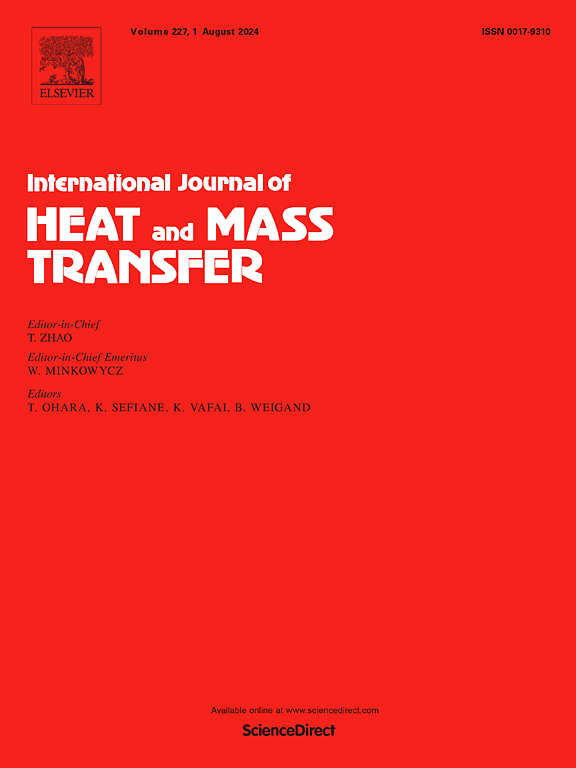使用热泵代替PTC加热器的纯电动卡车的行驶里程改善
IF 5.8
2区 工程技术
Q1 ENGINEERING, MECHANICAL
International Journal of Heat and Mass Transfer
Pub Date : 2025-10-13
DOI:10.1016/j.ijheatmasstransfer.2025.127910
引用次数: 0
摘要
《巴黎协定》(2016年)和《欧洲绿色协议》(2018年)加速了交通运输部门,特别是重型车辆零排放技术的发展。纯电动汽车(bev)虽然提供了有希望的减排,但由于客舱加热的巨大能源需求,在寒冷的环境条件下,行驶里程受到限制。本研究探讨了热泵系统作为传统的正温度系数(PTC)加热器在重型电动卡车应用中的替代性能。利用GT-Suite开发了详细的一维(1D)车辆热模型,以模拟配备300千瓦时电池组的16吨纯电动卡车的动态行为。仿真是在0°C环境条件下使用On-Road Fuel Economy驾驶循环进行的。与PTC加热器配置相比,热泵系统实现了31.64%的辅助热能消耗减少,导致整体电池能耗提高1.18%。这些改进转化为在寒冷气候下行驶里程的显著增加。这项研究证明了在重型电动卡车中集成热泵系统的可行性和有效性,这在以前的文献中没有被广泛覆盖,主要集中在乘用车上。尽管已有大量研究利用各种仿真平台(包括广泛采用的MATLAB/Simulink和Modelica等工具)探索了电动汽车的热管理,但专门针对重型纯电动卡车的全面研究,特别是针对这里采用的详细的一维热建模方法,仍不太常见。本文章由计算机程序翻译,如有差异,请以英文原文为准。
Range improvement in BEV trucks using heat pump for cabin heating instead of PTC heater
The Paris Agreement (2016) and the European Green Deal (2018) have accelerated the development of zero-emission technologies in the transportation sector, particularly for heavy-duty vehicles. Battery electric vehicles (BEVs), while offering promising emission reductions, suffer from range limitations under cold ambient conditions due to the significant energy demand for cabin heating. This study investigates the performance of a heat pump system as an alternative to the conventional Positive Temperature Coefficient (PTC) heater in a heavy-duty electric truck application. A detailed one-dimensional (1D) vehicle thermal model is developed using GT-Suite to simulate the dynamic behavior of a 16-ton BEV truck equipped with a 300 kWh battery pack. The simulation is conducted under 0 °C ambient conditions using the On-Road Fuel Economy driving cycle. Compared to the PTC heater configuration, the heat pump system achieved a 31.64% reduction in auxiliary thermal energy consumption, resulting in a 1.18% improvement in overall battery energy consumption. These improvements translate into a measurable increase in driving range under cold climate scenarios. This study demonstrates the feasibility and effectiveness of integrating heat pump systems in heavy-duty electric trucks, which has not been extensively covered in previous literature focused primarily on passenger vehicles. While numerous studies have explored EV thermal management using various simulation platforms, including widely adopted tools like MATLAB/Simulink and Modelica, a comprehensive investigation specifically for heavy-duty BEV trucks, particularly focusing on the detailed 1D thermal modeling approach adopted here, remains less common.
求助全文
通过发布文献求助,成功后即可免费获取论文全文。
去求助
来源期刊
CiteScore
10.30
自引率
13.50%
发文量
1319
审稿时长
41 days
期刊介绍:
International Journal of Heat and Mass Transfer is the vehicle for the exchange of basic ideas in heat and mass transfer between research workers and engineers throughout the world. It focuses on both analytical and experimental research, with an emphasis on contributions which increase the basic understanding of transfer processes and their application to engineering problems.
Topics include:
-New methods of measuring and/or correlating transport-property data
-Energy engineering
-Environmental applications of heat and/or mass transfer

 求助内容:
求助内容: 应助结果提醒方式:
应助结果提醒方式:


